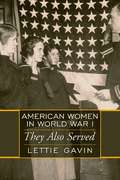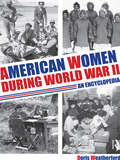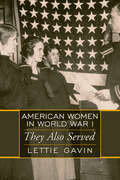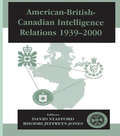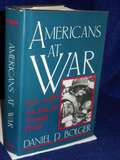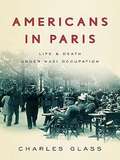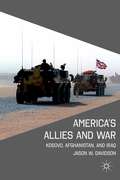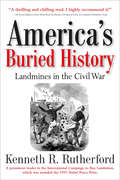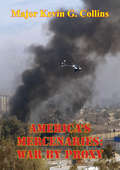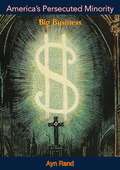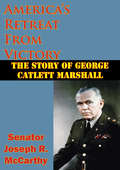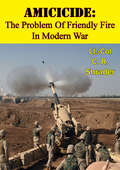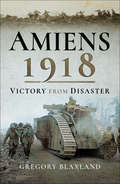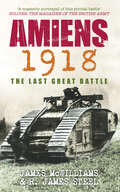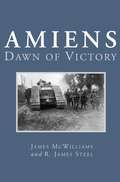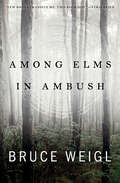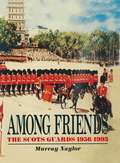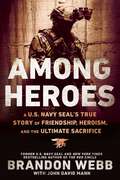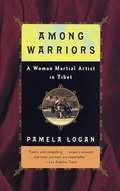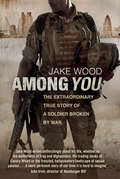- Table View
- List View
American Women In World War I
by Lettie GavinInterweaving personal stories with historical photos and background, this lively account documents the history of the more than 40,000 women who served in relief and military duty during World War I. Through personal interviews and excerpts from diaries, letters, and memoirs, Lettie Gavin relates poignant stories of women's wartime experiences and provides a unique perspective on their progress in military service. American Women in World War I captures the spirit of these determined patriots and their times for every reader and will be of special interest to military, women's, and social historians.
American Women and Flight since 1940: since 1940
by Deborah G. Douglas“Individual women’s stories enliven almost every page” of this comprehensive illustrated reference, now updated, from the National Air and Space Museum (Technology and Culture).Women run wind tunnel experiments, direct air traffic, and fabricate airplanes. American women have been involved with flight from the beginning. But until 1940, most people believed women could not fly, that Amelia Earhart was an exception to the rule. World War II changed everything. “It is on the record that women can fly as well as men,” stated General Henry H. Arnold, commanding general of the Army Air Forces. Then the question became “Should women fly?” Deborah G. Douglas tells the story of this ongoing debate and its impact on American history. From Jackie Cochran, whose perseverance led to the formation of the Women’s Army Service Pilots (WASP) during World War II to the more recent achievements of Jeannie Flynn, the Air Force’s first woman fighter pilot and Eileen Collins, NASA’s first woman shuttle commander, Douglas introduces a host of determined women who overcame prejudice and became military fliers, airline pilots, and air and space engineers. Not forgotten are stories of flight attendants, air traffic controllers, and mechanics. American Women and Flight since 1940 is a revised and expanded edition of a Smithsonian National Air and Space Museum reference work. Long considered the single best reference work in the field, this new edition contains extensive new illustrations and a comprehensive bibliography.
American Women during World War II: An Encyclopedia
by Doris WeatherfordAmerican Women during World War II documents the lives and stories of women who contributed directly to the war effort via official and semi-official military organizations, as well as the millions of women who worked in civilian defense industries, ranging from aircraft maintenance to munitions manufacturing and much more. It also illuminates how the war changed the lives of women in more traditional home front roles. All women had to cope with rationing of basic household goods, and most women volunteered in war-related programs. Other entries discuss institutional change, as the war affected every aspect of life, including as schools, hospitals, and even religion. American Women during World War II provides a handy one-volume collection of information and images suitable for any public or professional library.
American Women in World War I: They Also Served
by Lettie GavinInterweaving personal stories with historical photos and background, this lively account documents the history of the more than 40,000 women who served in relief and military duty during World War I. Through personal interviews and excerpts from diaries, letters, and memoirs, Lettie Gavin relates poignant stories of women's wartime experiences and provides a unique perspective on their progress in military service. American Women in World War I captures the spirit of these determined patriots and their times for every reader and will be of special interest to military, women's, and social historians.
American-British-Canadian Intelligence Relations, 1939-2000 (Studies in Intelligence)
by David Stafford Rhodri Jeffreys-JonesThis work considers, for the first time, the intelligence relationship between three important North Atlantic powers in the Twenty-first century, from WWII to post-Cold War. As demonstrated in the case studies in this volume, World War II cemented loose and often informal inter-allied agreements on security intelligence that had preceded it, and created new and important areas of close and formal co-operation in such areas as codebreaking and foreign intelligence.
Americans At War 1975-1986: An Era Of Violent Peace
by Daniel P. BolgerDiscusses American military capabilities and operations undertaken since the end of the Vietnam War, detailing the tactics, the planning, the leadership, and the political realities that lead to the rise of the "limited engagement."
Americans in Paris: Life and Death Under Nazi Occupation
by Charles GlassAcclaimed journalist Charlie Glass looks to the American expatriate experience of Nazi-occupied Paris to reveal a fascinating forgotten history of the greatest generation. In Americans in Paris, tales of adventure, intrigue, passion, deceit, and survival unfold season by season, from the spring of 1940 to liberation in the summer of 1944, as renowned journalist Charles Glass tells the story of a remarkable cast of expatriates and their struggles in Nazi Paris. Before the Second World War began, approximately thirty thousand Americans lived in Paris, and when war broke out in 1939 almost five thousand remained. As citizens of a neutral nation, the Americans in Paris believed they had little to fear. They were wrong. Glass's discovery of letters, diaries, war documents, and police files reveals as never before how Americans were trapped in a web of intrigue, collaboration, and courage. Artists, writers, scientists, playboys, musicians, cultural mandarins, and ordinary businessmen-all were swept up in extraordinary circumstances and tested as few Americans before or since. Charles Bedaux, a French-born, naturalized American millionaire, determined his alliances as a businessman first, a decision that would ultimately make him an enemy to all. Countess Clara Longworth de Chambrun was torn by family ties to President Roosevelt and the Vichy government, but her fiercest loyalty was to her beloved American Library of Paris. Sylvia Beach attempted to run her famous English-language bookshop, Shakespeare & Company, while helping her Jewish friends and her colleagues in the Resistance. Dr. Sumner Jackson, wartime chief surgeon of the American Hospital in Paris, risked his life aiding Allied soldiers to escape to Britain and resisting the occupier from the first day. These stories and others come together to create a unique portrait of an eccentric, original, diverse American community. Charles Glass has written an exciting, fast-paced, and elegant account of the moral contradictions faced by Americans in Paris during France's dangerous occupation years. For four hard years, from the summer of 1940 until U.S. troops liberated Paris in August 1944, Americans were intimately caught up in the city's fate. Americans in Paris is an unforgettable tale of treachery by some, cowardice by others, and unparalleled bravery by a few.
America’s Allies and War: Kosovo, Afghanistan, and Iraq
by Jason W. DavidsonWhy do Britain, France, and Italy provide or refuse military support for U. S. -led uses of force? This book provides a unique, multiple-case study analysis of transatlantic burden-sharing. Sixty original interviews with top policymakers and analysts provide insight into allies' decisions regarding the Kosovo War, Afghanistan, and the Iraq War.
America’s Buried History: Landmines in the Civil War
by Kenneth R. RutherfordDespite all that has been published on the American Civil War, one aspect that has never received the in-depth attention it deserves is the widespread use of landmines across the Confederacy. These “infernal devices” dealt death and injury in nearly every Confederate state and influenced the course of the war. Kenneth R. Rutherford rectifies this oversight with America’s Buried History: Landmines in the Civil War, the first book devoted to a comprehensive analysis and history of the fascinating and important topic. Modern landmines were used for the first time in history on a widespread basis during the Civil War when the Confederacy, in desperate need of an innovative technology to overcome significant deficits in materiel and manpower, employed them. The first American to die from a victim-activated landmine was on the Virginia Peninsula in early 1862 during the siege of Yorktown. Their use set off explosive debates inside the Confederate government and within the ranks of the army over the ethics of using “weapons that wait.” As Confederate fortunes dimmed, leveraging low-cost weapons like landmines became acceptable and even desirable. The controversial weapon was the brainchild of Confederate General Gabriel J. Rains (who had experimented with explosive booby traps in Florida two decades earlier during the Seminole Wars, and other Confederates soldiers developed a sundry of landmine varieties, including command-controlled and victim-activated. The devices saw extensive use in Virginia, at Port Hudson in Louisiana, in Georgia, the Trans-Mississippi Theater, during the closing weeks of the war in the Carolinas, and in harbors and rivers in multiple states. Debates over the ethics of using mine warfare did not end in 1865, and are still being waged to this day. Dr. Rutherford, who is known worldwide for his work in the landmine discipline, and who himself lost his legs to a mine in Africa, relies on a host of primary and secondary research to demonstrate how and why the mines were built, how and where they were deployed, the effects of their use, and the reactions of those who suffered from their deadly blasts. America’s Buried History is an important contribution to the literature on one of the most fundamental, contentious, and significant modern conventional weapons. According to some estimates, by the early 1990s landmines were responsible for more than 26,000 deaths each year worldwide. Landmines, argues Dr. Rutherford, transitioned from “tools of cowards” and “offenses against democracy and civilized warfare” to an accepted form of warfare until the early 1990s. The genesis of this acceptance began during the American Civil War.
America’s Concentration Camps: The Facts About Our Indian Reservations Today
by Carlos B. EmbryIn this book, which was first published in 1956, Kentucky newspaper editor, publisher and writer Carlos B. Embry presents a detailed examination of the legal, political and socioeconomic status of Native Americans.“A devastating survey of the plight of the American Indian touches on the history that preceded the retreat to the reservations, the nature of the Indian Bureau and its seeming philosophy of perpetual paternalism, and tells the story of the tribes through the viewpoint of their leaders.”—Kirkus Review
America’s Mercenaries: War By Proxy
by Major Kevin G. CollinsAlthough the government's reliance on contractors to support military forces is not a new phenomenon, the degree to which contractors are involved in Operations Enduring Freedom and Iraqi Freedom (OIF) has increased substantially. In OIF in particular, contractors perform a wide range of services in support of stabilization and reconstruction efforts. Perhaps the most controversial and arguably the most troublesome of these contractors are those that are armed and use violence in the course of fulfilling their contractual obligations. This thesis explores whether or not such contractors, herein identified as private security providers (PSPs), have a destabilizing influence on United States political and military objectives. In doing so, the thesis identifies and evaluates the legal environment in which PSPs operate the intersection between PSP activities and critical requirements and vulnerabilities of coalition forces and PSP involvement within logical lines of operation within Iraq. In concluding, the author posits that PSPs have a destabilizing impact on not only the political and military mission, but the United States military as well. Finally, the author provides recommendations for employing PSPs in the present and future conflicts.
America’s Persecuted Minority: Big Business
by Ayn RandAmerica’s Persecuted Minority: Big Business was a lecture delivered by Ayn Rand at the Ford Hall Forum, Boston, on December 17, 1961, and at Columbia University on February 15, 1962. Rand argues that “every ugly, brutal aspect of injustice toward racial or religious minorities is being practiced towards businessmen” under America’s antitrust laws. Rand catalogues the injustices of antitrust, decries the scapegoating of businessmen, analyzes particular cases, rejects antitrust laws as non-objective and calls for their ultimate repeal.
America’s Retreat From Victory: The Story Of George Catlett Marshall
by Senator Joseph R. McCarthyBy 1950 General George C. Marshall was seen by the American public an outstanding hero of their time; his masterful direction as chief of the US Army Staff during World War Two has set him up as an almost unassailable public figure. However hardline senator Joseph McCarthy took no prisoners, and in this well researched account, he takes a furious swipe at the General. Although future generations were only to know McCarthy for his ill-advised witchhunts later in his career, this book still stands as a damning indictment of the conduct of the American War Policy during the Second World War and particularly General Marshall.
Amicicide: The Problem Of Friendly Fire In Modern War [Illustrated Edition]
by Lt.-Col C. R. ShraderIncludes 10 detailed tables'War is often depicted in the textbooks as a well-orchestrated, albeit violent, exercise in which opposing units strive to achieve tactical and strategic objectives. That each side will suffer casualties in the process is taken for granted; they are the inevitable, if regretable, consequence of such a deadly undertaking. That each side is almost certain to suffer casualties inflicted by its own forces is not generally taken for granted. Yet, in each of America's wars, especially those of the twentieth century, a significant number of soldiers have been killed or wounded as the result of friendly fire. The fact that the percentage of casualties resulting from friendly fire from World War I through Vietnam has been extremely low does not make the accidental killing or wounding of one's own troops any less tragic or unpalatable. Nor does it offer much consolation to the commander responsible for the lives of his troops or to the soldier who runs the risk of falling victim to the fire of his own forces.To be sure, each branch of the Army and each of the Armed Services employ measures calculated to prevent incidents of friendly fire...Before one can undertake a serious and comprehensive analysis of friendly fire, these data must be found and brought together in one place.In Amicicide: The Problem of Friendly Fire in Modern War, LTC Charles R. Shrader has taken a major step toward the compilation of these data. In his well-informed narrative, he draws tentative conclusions about the causes and effects of friendly fire and offers recommendations for those who expect to study the subject further. He has, in short, produced a superb reference book and a springboard for a deeper and more comprehensive analysis of this grim and complex problem.'-Foreword
Amiens 1918: From Disaster to Victory
by Gregory BlaxlandGregory Blaxland has written a superb account of 1918, the final year of the war when the balance of advantage between the combatants changed so dramatically in a matter of weeks that summer.As the realities of the changing nature of warfare by late 1917 made the retention of static lines, no matter how sophisticated, no longer a long term viable option for the defence; and with Russia knocked out of the war, the Germans under Hindenburg and Ludendorff determined on a bold series of major offensives, the first of which was aimed at the British Fifth Army with the objective of seizing Amiens, a crucial rail head and the city that marked the boundary between the BEF and the French. Capture this and the Germans had a good chance of separating the key allied powers. Despite almost destroying Fifth Army and advancing within ten miles of Amiens, the Germans failed in their objective; they turned to a number of other hard thrusts along the line but were foiled on each occasions.Reinforced by substantial numbers of American troops, the allies launched their first, French led, counter attack on 18 July, which many considered the turning point of the 1918 campaign and, indeed the whole war. Shortly afterwards, on 8 August, the BEF (with some French support) attacked with Fourth Army before Amiens and was stunningly successful what Ludendorff described as the Black Day of the German Army. There followed a sequence of blows by all the allies along the Western Front, pushing the Germans back to the borders; with her allies collapsing and with the Imperial Navy in a state of mutiny,The book largely concentrates on the British and Dominion troops of the BEF. The first half is taken up with the attack on Amiens (and, to a lesser extent, on Arras). In the second half of the book the author provides a cohesive account of the British response in retaking the initiative from the Germans, though not failing to give allied nations their due.Besides giving a full narrative account, he also provides a useful critical commentary of the performance of armies and generals.This is a welcome reprint of an accessible account of the crucial year of the war, when on the Western Front the conflict broke free of its entrenched deadlock. Despite the extraordinary achievements of the BEF in 1918, they still remain remarkably little known and even less appreciated.
Amiens 1918: The Last Great Battle
by James McWilliams R James SteelOn 8 August 1918, the Allied forces launched the surprise attack that heralded the end of the First World War. With skill and daring, 21 divisions of men breached the German lines, supported by 500 tanks and 1,000 aircraft. This book considers the successes and failures of both sides in this conflict.
Amiens: Dawn of Victory
by James McwilliamsIt was the decisive battle of World War I. German commander Erich Ludendorff called it "the black day of the German army." Many authors have stated that it was the beginning of the end of the great conflict. And yet, until now, no book has been published on the climactic battle at Amiens.Amiens was one of the first "modern" battles, and certainly the first attempted by the Allies. Employing the troops of five nations (including Canada) and utilizing secrecy, deception, and combined operations, the Allies won the first of a string of victories culminating in the Armistice one hundred days later.Amiens: Dawn of Victory is the first book to study the historic battle in minute detail. Using eyewitness accounts from dozens of survivors, plus many accounts, both published and unpublished, by the participants, the authors take us into the trenches, the tanks, and the cockpits.
Amina's Blanket
by Helen DunmoreAs Josie and her class make a beautiful patchwork quilt to send to a war-torn country, Amina, who lives far away, shivers in her darkened apartment surrounded by noisy explosions.
Amirs, Admirals & Desert Sailors
by David F. WinklerHost to the U.S. Navy for nearly six decades, Bahrain has been a steadfast American ally in the turbulent Middle East. Its unique relationship with the United States evolved through a series of friendships between Bahrain s ruling Al Khalifa royal family and top U.S. Navy flag officers assigned to the fleet in the Gulf. Over the years it has become a strategic partnership critical to global security.As naval historian David F. Winkler examines these developing relationships, he offers a fascinating overview of Bahraini history, the entry of American humanitarian and economic interests, the establishment of an American naval presence in the Cold War, the Arab-Israeli conflicts, and the downfall of the Iranian shah, among other subjects. The author tells the story from both Bahraini and American perspectives.Given U.S. commitment to the region and its concurrent objectives of combating the global war on terrorism and establishing democracy, this book provides an important historical context for those interested in a crucial facet of American foreign relations. While many works describe the history of U.S. diplomatic and military involvement in the Gulf, this is the first to cover in depth the history of the U.S. Navy in Bahrain.
Amish Traditions
by Joseph Warren Yoder“Joseph Yoder (September 22, 1872 – November 13, 1956) was an educator, musicologist, and writer, the first successful Mennonite literary figure in the United States, especially known for his semi-fictional account of his mother's life, Rosanna of the Amish (1940), and for his investigation of the sources of the Amish tunes of the Ausbund, along with his efforts to record and preserve traditional Amish music.”-Wiki“I felt that someone who knows the Amish should write a truthful book about them and show the world their good qualities, instead of magnifying; their peculiarities. So, after thinking about it for about twenty years, and after reading a book called “Straw in, the Wind,” which I thought was very unfair, I determined to write my book, “Rosanna of the Amish.” But may I say that writing a book is no small job. First, it takes a lot of work; second it takes a lot of money to have it printed, but those are not the worst things to think about. What are you going to do if the people do not like your book, do not buy it, and you lose everything you put into it? Even though these discouraging things stared me in the face, I wrote it anyway, and may I say without boasting, that since seven printings have already been made and the book is still selling well, and every now and then I receive a letter from some far off country saying how much they liked Rosanna of the Amish, I am not sorry that I wrote it.”-From the Author’s introduction.
Among Elms, in Ambush
by Bruce WeiglThis powerful new work by Bruce Weigl follows the celebrated poet and Vietnam War veteran as he explores combat, survival, and PTSD in brief prose vignettes. In compact, transcendent, and poetic prose, Bruce Weigl chronicles somber observations on the present day alongside painful memories of the war. Reflections on school shootings and the lightning-fast spread of news in the 21st century are set alongside elegies for forgotten soldiers and the lifelong struggle of waiting for the trauma of war to fade. Haunting and nuanced, Among Elms, in Ambush carries readers through meditations and medications, past the shapes of figures in the dark rice fields of Viet Nam and the milkweed pods in the frost-covered fields of Ohio, toward a hard-won determination to survive.
Among Friends: The Scots Guards, 1956–1993
by Murray NaylorThis book provides a complete insight into the history of the Scots guards from 1956-1993.
Among Heroes
by John David Mann Brandon WebbNow from Brandon Webb, Navy SEAL sniper and New York Times bestselling author, comes his personal account of the eight friends and fellow SEALs who made the ultimate sacrifice. "Knowing these great men--who they were, how they lived, and what they stood for--has changed my life. We can't let them be forgotten. So read about these amazing men, share their stories, and learn from them as I have. We've mourned their deaths. Let's celebrate their lives."--Brandon WebbAs a Navy SEAL, Brandon Webb rose to the top of the world's most elite sniper corps, experiencing years of punishing training and combat missions from the Persian Gulf to Afghanistan. Among the best of the best, he led the SEALs' clandestine sniper training program as course manager, instructing a new generation of the world's top snipers. Along the way, Webb served beside, trained, and supported men he came to know not just as fellow warriors, but as friends and, eventually, as heroes. Among Heroes gives his personal account of these eight extraordinary SEALs, who gave all for their comrades--and their country.Here are the true stories behind the remarkable valor and abiding humanity of those "sheepdogs" (as they call themselves) who protect us from the wolves of the world. Of Matt "Axe" Axelson, who perished on the Lone Survivor mission in Afghanistan. Of Chris Campbell, Heath Robinson, and JT Tumilson, who were among the thirty-eight casualties of Extortion 17, the Chinook helicopter shot down in August 2011. Of Glen Doherty, Webb's best friend for more than a decade, killed while helping secure the successful rescue and extraction of American CIA and State Department diplomats in Benghazi, Libya, on September 11, 2012; and other close friends, classmates, and fellow warriors.In Among Heroes, Webb offers eight intensely personal profiles of uncommon courage--who these men were, what they stood for, and how they came to make the ultimate sacrifice. These are men who left behind powerfully instructive examples of what it means to be alive--and what it truly means to be a hero.INCLUDES PHOTOS
Among Warriors: A Woman Martial Artist in Tibet
by Pamela LoganPamela Logan, a recognized expert in the martial arts, gives a breathtaking account of her journey across the windswept plateaus and icy mountain passes of eastern Tibet.
Among You: The Extraordinary True Story of a Soldier Broken by War
by Jake WoodAmong You is the gripping real-life story of a soldier serving on the front line in Iraq and Afghanistan, and an unforgettable, unflinching account of the effects of post-traumatic stress disorder.Jake Wood lives parallel lives: encased in the glass tower of an international investment bank by day, he is also a dedicated TA soldier who serves on the front line during the invasion of Iraq, later returning to the war zone to conduct surveillance on insurgents. Disillusioned with the dullness and amorality of the banking world, he escapes back to the army for a third tour of duty. But in Afghanistan he discovers the savage, dehumanising effects that war has on both the body and the mind. Diagnosed with chronic PTSD on his return, he must now fight the last enemy – himself – in order to exorcise the ghosts of his past.Brutally honest and beautifully written, Among You brings home the harsh reality of front-line combat in Iraq and Afghanistan, and the courage of the troops who risk their lives for their country, as well as revealing the devastating after-effects of service.
